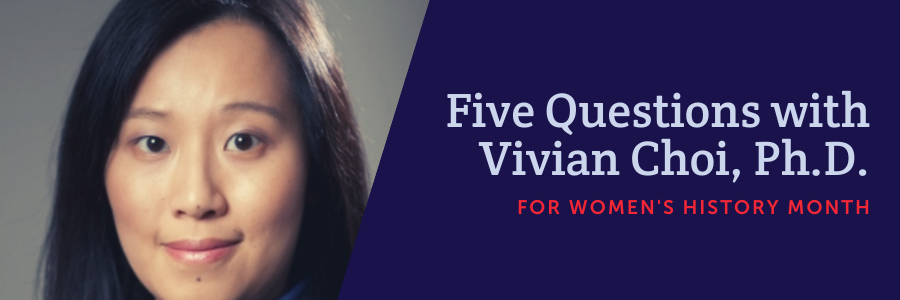Five Questions with Vivian Choi, Ph.D., for Women's History Month
Catherine Gillespie - March 22, 2021
Vivian Choi, Ph.D, talks about the critical role mentorship has played in her career, breaking out of her shell, and paying forward what she's learned.

In our third interview for Women’s History Month, we talked to Vivan Choi, Ph.D., the head of global gene therapy research at Takeda.
How would you say gender has influenced your career path, in terms of mentorship you received and opportunities?
I truly believe that one’s career path is influenced and shaped by our experiences and the environment that we’re in. I consider myself very fortunate to have been trained and worked in environments that encourage talent development no matter what gender we are. This type of environment gives us opportunities, as women scientists, to learn from what works well from everyone. I’ve had both male and female mentors throughout my scientific journey and having this gender-balanced experience let me learn the best from both sides.
How would you describe the importance of mentorship in your career trajectory?
Mentorship has played a very critical role in my career. My academic mentors helped me establish a strong scientific foundation and my industrial mentors showed me how drug development works and how to apply science to decision making. All of my mentors have influenced and shaped the scientist I am today. They all have different styles, modes of communication, and ways to bring the best out in me. These qualities can be summed up by a particular experience: All of my mentors can frankly tell me what I could have done better and what my weaknesses are. It’s not easy to listen to those comments, but as we practice active listening and keep an open mind, it is indeed beneficial to our development if we take that feedback into serious consideration.
How have particular obstacles that have come up in your career shaped your role in the field?
I think my biggest obstacle is my quiet personality. It took time and opportunities to break out of the shell but with great mentors and a safe environment to practice, I’ve made constant improvement. However, sometimes, it does take some dramatic situations and they really push one’s limit. I would share my experiences with young women in science to be brave, trust your training, and trust yourself while being receptive to comments.
I would share my experiences with young women in science to be brave, trust your training, and trust yourself while being receptive to comments.
Vivan Choi, Ph.D.
How would you describe mentorship “best practices” when it comes to your own style of mentoring junior women?
All the great mentors that I’ve had have one thing in common: They all communicate with me directly and to the point and yet listen to what I struggle with. They provide their opinion to me and put themselves in my scenarios. They help me develop a method of thinking through the problem without always providing me with solutions (well, sometimes, I do need a solution!). I’ve indeed used the same approach with my own mentees. For those who don’t work with me in the same organization, and whenever they reach out, I provide my listening ears and my opinion and analysis. For those who are in my group, I do the above while also showing them the way with actions, knowing that they’ll evolve in their own individual ways while maintaining the concepts that can lead to a successful outcome. I’ve been lucky to have great mentors (and still in this environment) so I like to pay it forward to develop the next generation of leaders.
What do you see as ASGCT’s role in promoting strong mentorship or furthering opportunities for networking among women in science?
There are quite a few successful women scientists in the gene therapy field and seeing them present and be available to be mentors for junior scientists would add a lot of value to the ASGCT community. Understanding their very busy schedule, long-term mentorship may not be feasible. However, if there could be one-off workshops where we can listen to their scientific and career experiences in an informal seminar setting, followed by a Q&A time could be useful.
Ms. Gillespie is a senior scientific editor for the Center for Cell and Gene Therapy at Baylor College of Medicine and a member of the ASGCT Communications Committee.